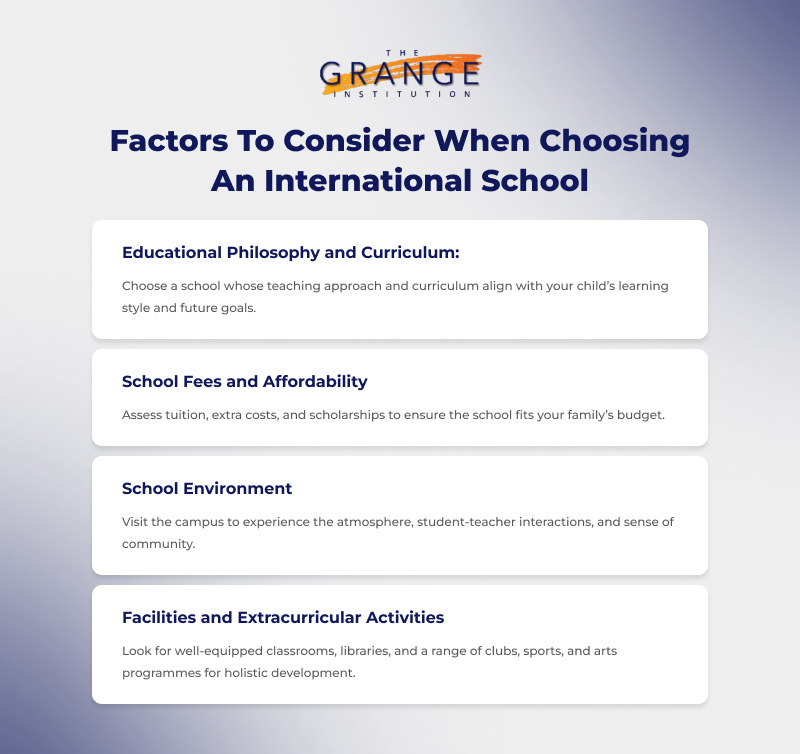As a parent, you’ve likely faced moments of doubt and confusion when thinking about your child’s education: “Is this school the right fit for them?”, “Will they thrive socially and academically?”, or “Are we making the best choice for their future?” These questions are common, especially with the wide variety of international schools in Singapore, each offering different curricula, teaching philosophies, and learning environments.
Choosing the right international school is more than just picking a reputable institution—it’s about ensuring that your child receives an education that nurtures their talents, aligns with their learning style, and prepares them for a rapidly changing world. When it comes down to how to choose an international school, the wrong choice can lead to stress, disengagement, and missed opportunities, while the right one can foster confidence, curiosity, and long-term success.
So, we’ve put together this guide to help parents like you navigate the often overwhelming process of selecting an international school. From understanding different curricula to evaluating school environments and extracurricular offerings, this guide provides practical tips and key insights to make the decision easier.
We’ll cover how to match your child’s unique learning style and personality with the right school, explore the benefits of international education, and answer common questions parents have about school choices. By the end, you’ll have a clear roadmap on how to choose an international school that supports your child’s academic success, social development, and personal growth.
Key Takeaways
- Assess Your Child’s Needs First: Understanding your child’s learning style, strengths, personality, and goals is essential when deciding how to choose an international school that fits them.
- Evaluate Curriculum, Environment, and Extracurriculars: Consider the school’s educational philosophy, global curricula, facilities, and extracurricular opportunities to ensure a holistic learning experience.
- Look Beyond Academics: A supportive, inclusive school culture and strong pastoral care foster emotional, social, and personal growth, preparing your child for success in a globalised world.
Factors to Consider when Choosing an International School

Choosing a school for your child can feel like a daunting task. With so many options available, how do you know which one will truly support your child’s learning and growth? To help you navigate this process, here’s a quick guide on how to choose an international school that aligns with your family’s needs and aspirations.
1. Educational Philosophy and Curriculum
The first step in how to choose an international school is to examine the school’s educational philosophy and curriculum. Different schools offer different approaches to teaching, and understanding the school’s ethos will help you determine whether it matches your child’s learning style and long-term goals. Some schools follow globally recognised curricula such as the Cambridge Curriculum, while others may offer American or Australian programmes.
Think about your child’s strengths and interests. Do they thrive in structured environments, or do they benefit from more flexible, inquiry-based learning? For instance, a Cambridge school places a strong emphasis on critical thinking and global citizenship, which may appeal to children who are independent thinkers. On the other hand, an American system might be more suited to students who prefer a traditional structure with a clear progression of subjects. Each school has its unique strengths and focus, so select one that aligns with your child’s learning style and future goals.
2. School Fees and Affordability
One of the most critical factors when learning how to choose an international school is assessing the overall cost. International schools in Singapore offer excellent education, but it’s important to ensure that the fees fit your family’s budget. International school fees vary greatly depending on the school and the curriculum it offers. Additionally, there may be extra costs such as registration fees, uniforms, textbooks, and co-curricular activities.
It’s also worth exploring the financial aid options available at different schools. Many international schools offer scholarships or sibling discounts that can ease the financial burden. Taking the time to research the Singapore private primary school fees and understanding the payment structure will help you make a more informed decision about which school is right for your child and family.
3. School Environment
Another crucial factor in how to choose an international school is the school environment. Although brochures and websites can give you a sense of the school’s offerings, nothing beats seeing the school in action. Consider visiting the campus, attending an open house, or even arranging a private tour. This will allow you to experience firsthand the school’s atmosphere, how students interact with teachers, and the overall vibe of the institution.
You can also engage with the staff and ask questions about how the school fosters a sense of community, inclusivity, and respect. A positive, nurturing environment is essential for a child’s emotional and social development, as it can foster a sense of belonging and encourage confidence.
4. Facilities and Extracurricular Activities
When deciding on how to choose an international school, make sure to examine the quality of the school’s facilities. Is the school well-equipped with functional classrooms, libraries, and tech resources? A well-rounded learning environment will enhance your child’s educational experience.
Beyond academics, consider the extracurricular activities offered. Does the particular international primary school in Singapore provide a diverse range of clubs, sports, and arts programmes? These activities play a significant role in a child’s holistic development, allowing them to explore their interests outside the classroom. From music to robotics and sports teams, a variety of extracurricular activities ensures that your child has the opportunity to grow in many areas beyond academics.
By considering these elements, you can ensure that your child receives the best possible education and support in an environment that matches their unique learning style and future goals.
Understanding Your Child’s Needs and Goals

Once you’ve evaluated the school’s curriculum, fees, environment, and extracurricular offerings, the next step in how to choose an international school is to focus on your child’s individual needs and goals. After all, even the most prestigious school won’t be the right fit if it doesn’t align with your child’s learning style, personality, and aspirations.
1. Assessing Your Child’s Learning Style
Every child absorbs information differently. Some are visual learners who grasp concepts better through images and diagrams, while others are auditory learners who excel through listening and discussion. Kinesthetic learners thrive through hands-on activities, and logical learners enjoy structured problem-solving.
Understanding your child’s preferred learning style is essential when figuring out how to choose an international school, as it helps identify schools that can provide the tailored teaching methods and support they need to thrive.
2. Identifying Strengths and Weaknesses
In addition to learning styles, take stock of your child’s academic strengths and areas where they may need extra guidance. Does your child excel in mathematics but struggle with language arts? Are they creative thinkers who flourish in project-based work, or do they benefit more from structured lessons?
Schools that offer personalised learning support, enrichment programmes, or small class sizes can help address weaknesses while nurturing their strengths, making it easier for you to decide how to choose an international school that matches your child’s unique profile.
3. Aligning the School’s Approach with Your Child’s Personality
Your child’s personality and social needs are just as important as their academic requirements. Consider how they handle new environments, interact with peers, and respond to challenges. Some children thrive in highly structured, disciplined settings, while others flourish in nurturing, flexible environments that encourage exploration and creativity.
Choosing a school with strong pastoral care, mentorship programmes, and a supportive community ensures your child feels safe, confident, and motivated, key factors when thinking about how to choose an international school for their long-term growth.
4. Involving Your Child in the Decision
Finally, involve your child in the process. Older children, in particular, benefit from discussing their preferences, interests, and expectations with you. Empowering them to contribute to the decision not only makes them feel valued but also helps ensure a smoother transition.
After all, a child who is excited about their school is more likely to engage fully, socially and academically. Taking these steps into account completes the picture of how to choose an international school that aligns with both your child’s needs and your family’s aspirations.
With these factors in mind, you can make a thoughtful choice that ensures your children thrive academically, socially, and emotionally. These factors will guide you in how to choose an international school that truly supports your child’s growth, sets them up for success, and aligns with your family’s long-term goals.
Benefits of Enrolling in an International School

After understanding your child’s unique needs and assessing potential schools, it’s equally important to consider the benefits that come with enrolling in an international school. Knowing these advantages will help you make a more informed decision and highlight why international education can be a transformative experience.
1. Exposure to a Global Curriculum and Diverse Perspectives
One of the most significant benefits of international schools is the exposure to globally recognised curricula, such as the International Baccalaureate (IB), Cambridge, or American programmes. These programmes are designed to develop well-rounded students with strong academic foundations, critical thinking skills, and a global outlook. When thinking about how to choose an international school, it’s essential to look at the curriculum’s ability to prepare your child for future academic and professional opportunities worldwide.
Beyond academics, international schools foster an environment rich in cultural diversity. Students learn alongside peers from different nationalities, languages, and backgrounds, which broadens their perspectives and encourages open-mindedness. Exposure to such diversity helps children appreciate different viewpoints, promoting tolerance, empathy, and global awareness from an early age.
2. Development of Cross-Cultural Competency and Social Skills
Interaction with a multicultural student body encourages children to develop strong interpersonal and social skills. They learn how to navigate different social situations, resolve conflicts respectfully, and collaborate effectively with peers from diverse backgrounds.
For parents in the journey of how to choose an international school, the opportunity for children to develop cross-cultural competency is an invaluable advantage that extends beyond textbooks and exams.
3. Opportunities for Language Acquisition and Multilingualism
Many international schools offer robust language programmes, from immersion courses to bilingual education, giving students the chance to become fluent in multiple languages. Learning additional languages enhances cognitive development, boosts communication skills, and provides a competitive edge in future academic and career pursuits. Parents evaluating how to choose an international school should pay attention to the school’s language offerings, as multilingualism is increasingly important in today’s globalised world.
4. Strong Emphasis on Holistic Development and Extracurriculars
International schools focus not just on academics, but on nurturing the whole child. From sports and performing arts to leadership programmes and community service, students have numerous opportunities to explore their interests and talents. This holistic approach ensures that children grow intellectually, emotionally, socially, and physically. So, when considering how to choose an international school, it’s crucial to assess the breadth and quality of extracurricular activities available, as these experiences contribute significantly to your child’s overall development.
In short, enrolling your child in an international school opens doors to a rich, global, and well-rounded education. From a strong curriculum and cultural diversity to language skills and holistic growth, the benefits are far-reaching, making international schooling a compelling choice for parents who want their children to thrive in a dynamic, interconnected world.
Frequently Asked Questions
1. What is the difference between the various international school curricula (IB, Cambridge, American, etc.)?
Each international school follows a distinct curriculum, each with its own strengths. The International Baccalaureate (IB) is globally recognised for its rigorous academic standards and emphasis on critical thinking, while the Cambridge curriculum offers a flexible, broad structure that is widely recognised in the UK and other countries. American curricula focus on a holistic approach, combining strong academics with a wide range of extracurricular opportunities.
When figuring out how to choose an international school, it’s essential to select a curriculum that aligns with your child’s strengths, interests, and future aspirations.
2. How do I assess whether my child will thrive in an international school environment?
Consider your child’s learning style, personality, and interests. International schools are known for their diverse student populations, so children who enjoy cultural exchange and thrive in dynamic environments often excel. Assess the school’s support systems, such as pastoral care, counselling, and language support, to ensure your child receives the guidance needed for a smooth transition.
Understanding these factors is an important part of how to choose an international school that fits both your child’s needs and your family’s expectations.
3. Are international schools only for expat families?
While international schools are popular among expatriate families, they are also open to local families. Many local parents choose international schools for their children because of globally recognised curricula and the opportunity to interact with peers from diverse backgrounds. However, it’s important to note that local students typically require special exemptions from the Ministry of Education (MOE) to enrol.
Conclusion
To sum this guide up, choosing the right international school is one of the most important decisions you will make for your child’s future. By carefully evaluating your child’s unique needs, learning style, strengths, and personality, you can identify a school that not only nurtures academic excellence but also supports emotional, social, and personal growth.
Consider the school’s curriculum, educational philosophy, facilities, extracurricular offerings, and overall environment. A school that aligns with your child’s goals and learning style will provide a foundation for lifelong learning, global awareness, and cross-cultural competence. Understanding these factors is key to how to choose an international school that truly supports your child’s development and prepares them for success in an interconnected world.
Remember, school culture and community matter just as much as academics. A nurturing, inclusive environment helps children feel confident, engaged, and inspired to reach their full potential. By taking the time to visit campuses, engage with staff, and involve your child in the decision-making process, you can ensure a smooth transition and a fulfilling international school experience.
If you’re ready to explore how an international school can empower your child and help them thrive academically and personally, The Grange Institution offers a supportive, world-class learning environment designed to meet the needs of every student. Reach out today to learn more and take the first step in shaping your child’s future.







